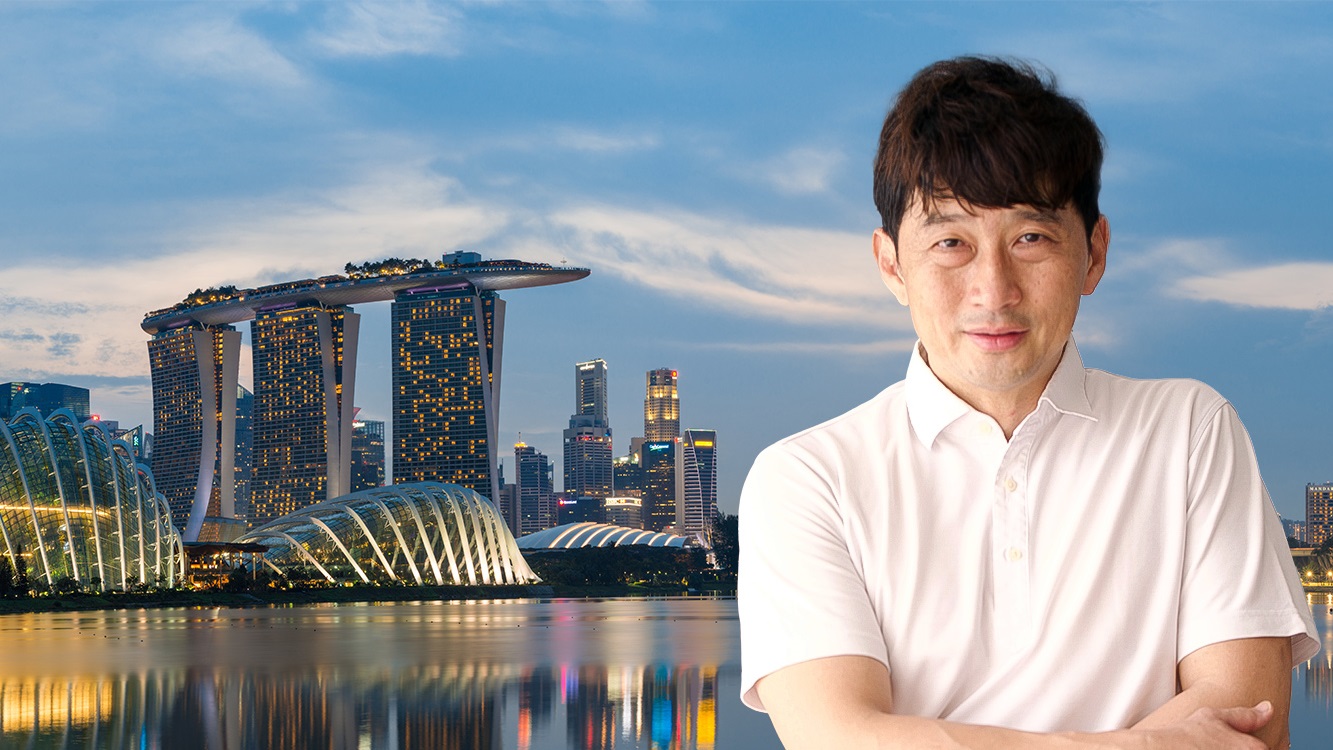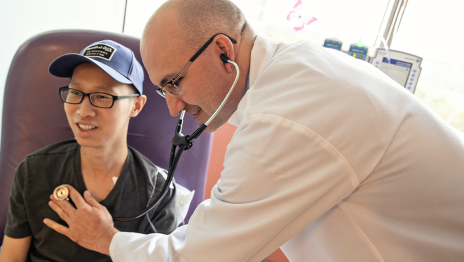By Eric Gallippo | Art by Graciella Demerath
Choon-Peng Ng (MBA ’04) has been a longtime advocate for the University of Michigan and a health care industry leader in the fight against cancer in Singapore. In 2010, he helped start what became the Alumni Association of the University of Michigan’s (AAUM) Pan-Asia Alumni Reunion, and four years later he founded his own company, ImmunoScape, focused on cancer treatment.
Through his work with alumni and donors, as well as his own financial support and mentoring, Ng has helped strengthen the university’s philanthropic connections globally and in the field of cancer research and treatment. Recently, that work has led to new partnerships between the university and two major cancer research institutions in the Asia-Pacific region: Singapore’s Cancer Science Institute and National Cancer Centre of Singapore.
Going Global talked with Ng to learn more about these partnerships, as well as what inspires his commitment to U‑M and the power of giving back.
Over the years, you’ve devoted countless hours to the Michigan community, from bringing its members together to mentoring the next generation of leaders to providing leadership around U‑M’s Pan-Asia Alumni Reunion. What is it about the Michigan alumni community that resonates so deeply with you?
I am committed to serving the Michigan alumni community because I believe it is one of the most vibrant and supportive communities in the world. I am inspired by the sense of loyalty and pride Michigan alumni have for their alma mater, and I am impressed by the diversity of the community.
I have met some of my closest friends through the Michigan community and also been able to network with other professionals, which has led to valuable connections. It has given me the opportunity to mentor and advise young professionals, and also helped me continue to grow my knowledge base at various conferences and events as a participant or speaker.
I am grateful for the opportunities that the Michigan alumni community has given me, and I am confident it will continue to be a source of strength and inspiration for me in the years to come.
You were instrumental in helping Michigan develop two new partnerships in Singapore, one with the Cancer Science Institute and one with the National Cancer Centre of Singapore. What do you find compelling about these collaborations, and what do you think their impact could be over time?
I believe these collaborations have the potential to make a significant impact on cancer research and care around the world. The Cancer Science Institute is a world-renowned research institute dedicated to the study of cancer. The institute has a strong track record of innovation, and it is home to some of the leading experts in cancer research. The National Cancer Centre of Singapore is the leading cancer center in the region and has an international reputation. The center provides comprehensive cancer care, and it is also a major research institute.
The partnerships could lead to the development of new cancer treatments, the identification of new cancer biomarkers, and the improvement of cancer care. I am also excited about the potential for these partnerships to train the next generation of cancer researchers and clinicians. They will create opportunities for U‑M students and faculty to collaborate with their counterparts in Singapore, and this will help build a global community of cancer researchers. Such collaborations will benefit patients at all three institutions.
You serve on the AAUM International Alumni Advisory Council as well as the Advisory Board for the Rogel Cancer Center. How do you think your—and others’—international perspectives have helped influence U‑M’s activities in these areas? Do you see an opportunity for more international alumni to get involved?
I believe that my international perspective has helped influence U‑M’s activities in a number of ways. I have shared my insights on the global landscape with university leadership, which has helped them better understand the opportunities and challenges U‑M faces in the international arena. I have connected U‑M with potential partners and collaborators around the world to help the university expand its global reach and build relationships that will benefit its students, faculty, and researchers. And I have advocated for the interests of international students and alumni to ensure that U‑M is a welcoming and inclusive environment for all students, regardless of their nationality.
I believe there is an opportunity for more international alumni to get involved. They have a unique perspective to offer, and they can play a valuable role in helping the university to achieve its global ambitions. International alumni can get involved in many ways, such as serving on advisory boards and committees, donating to scholarships and research funds, mentoring students and faculty, participating in events and conferences, and sharing their expertise with the university community.
Giving has always been part of your relationship with Michigan, whether it’s your own funds or working closely with others as a sounding board and an advisor regarding their philanthropy at Michigan. For example, Rich Rogel listened carefully to your advice ahead of making a recent $5 million commitment to support U‑M collaborations in Singapore. Has philanthropy always been important to you, or is this a set of values and activities that has evolved over time?
Philanthropy has always been important to me. I was raised in a family that valued giving back, and I saw firsthand the impact philanthropy can have. As I have gotten older, my own philanthropy has evolved to focus on causes I’m passionate about, to be more strategic, and to be more involved in the process. I’m proud of the impact my philanthropy has had, and I’m excited to see how it continues to evolve in the years to come.
I have become more focused on giving to causes that I’m passionate about, such as education, healthcare and my Christian faith. I have become more strategic in my giving, working to identify the most effective ways to make a difference and leverage my involvement with the expertise and involvement of others. And I have become more involved in the process of philanthropy, not only writing checks but also spending time working with organizations to help them achieve their goals. Michigan is certainly one of those organizations.
I believe philanthropy is one of the most powerful tools we have to make the world a better place, and I’m committed to using my resources to make a difference.


